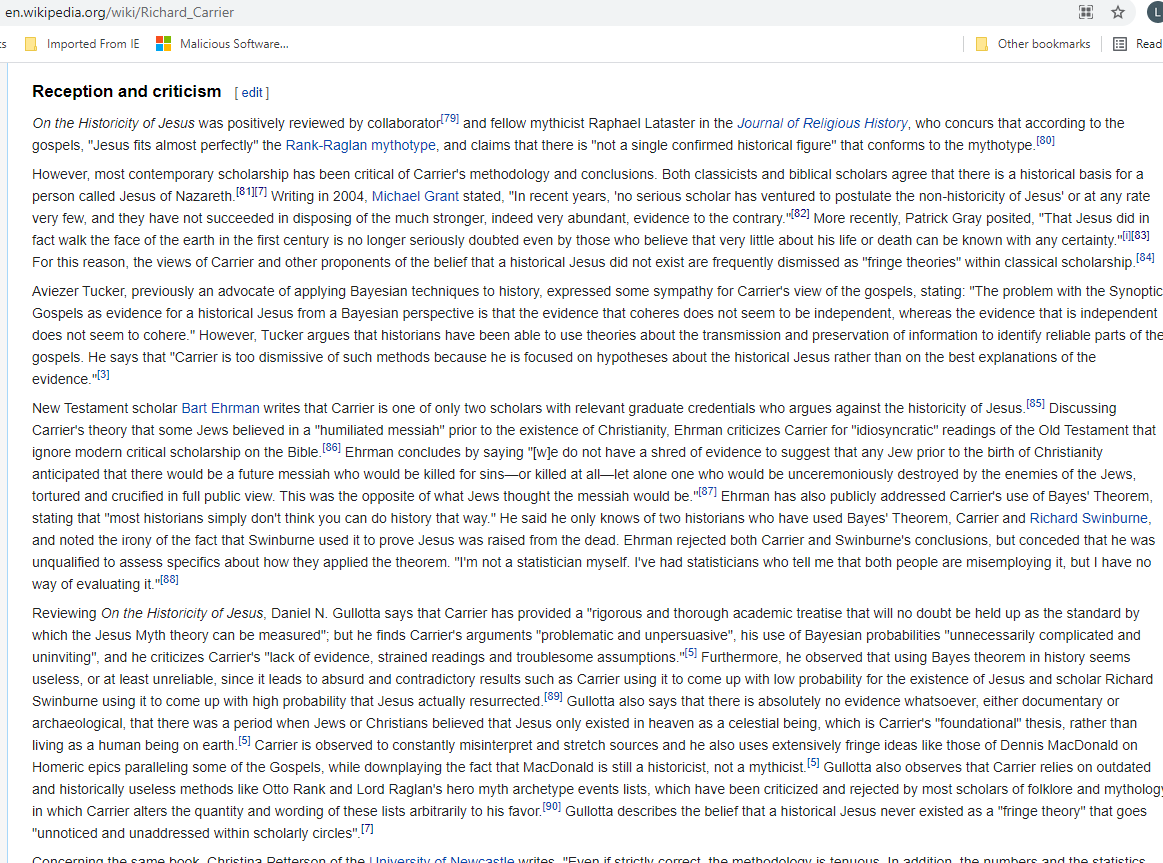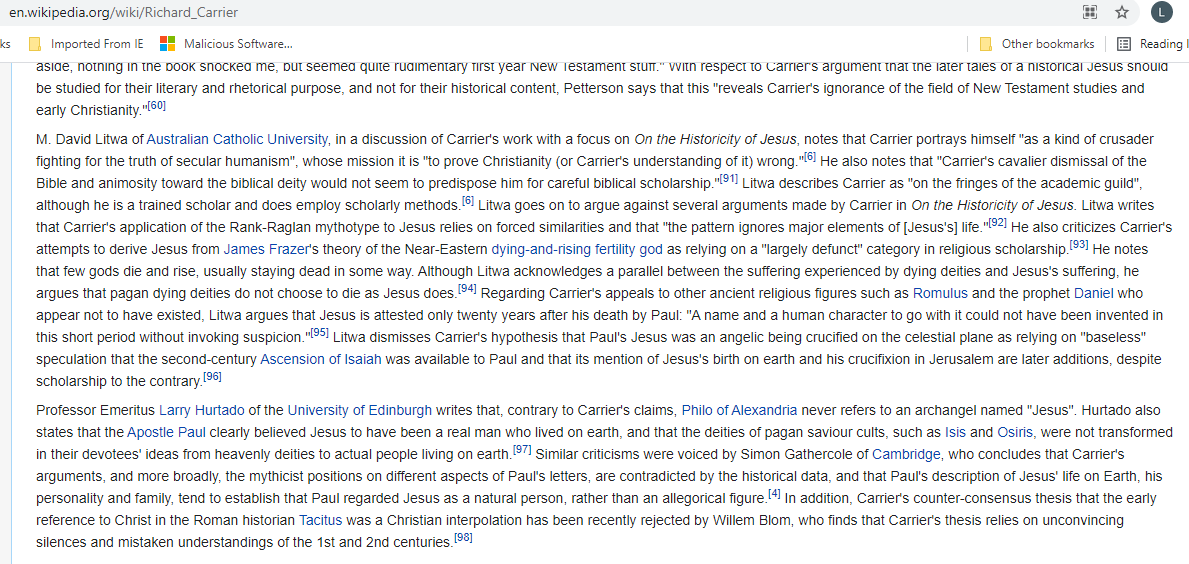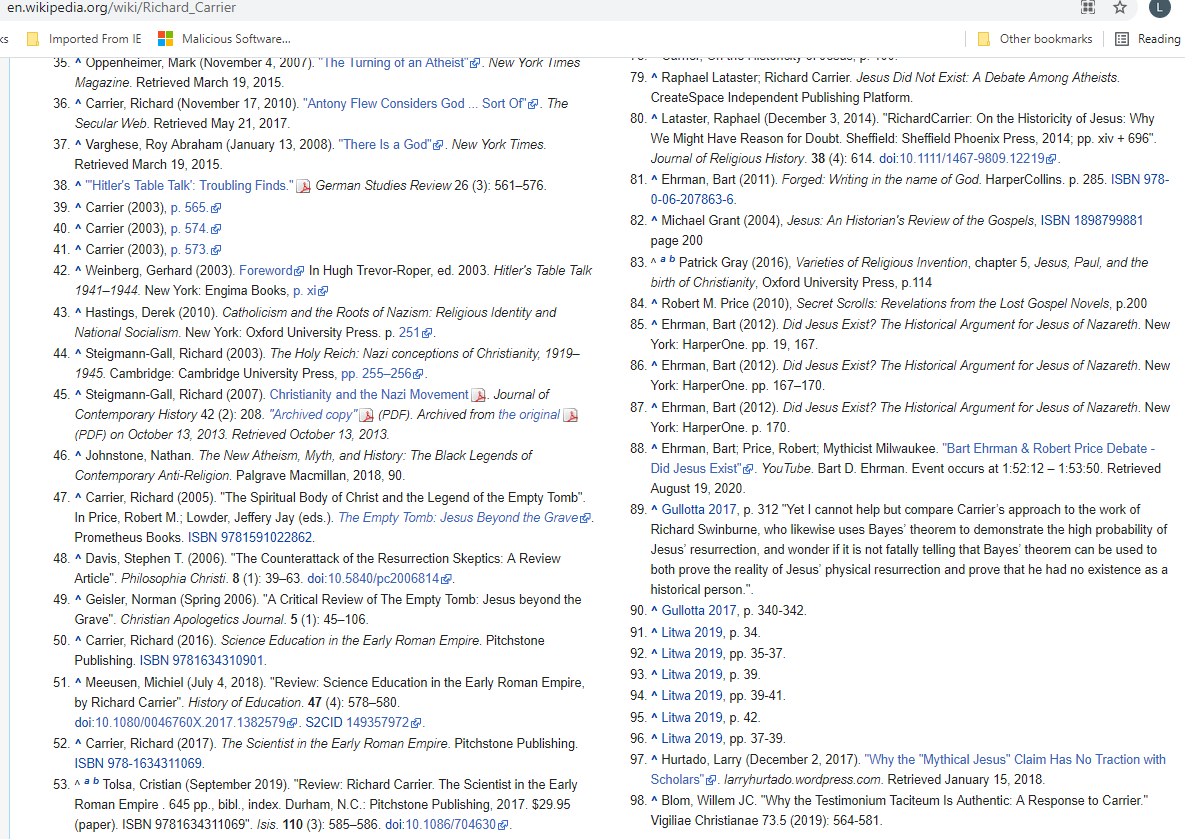学者们批判科里安的《关于耶稣的历史性》
张逸萍译自《维基百科》
科里安(Richard Carrier)的《关于耶稣的历史性∶为什么我们有理由怀疑》(On the Historicity of Jesus: Why We Might Have Reason for Doubt)是一本近年怀疑耶稣曾经降生地上做人的书籍。虽然已经有其他先驱,但也引起了一些轰动。
他认为耶稣并不是一个真正曾经活在地上的人。耶稣可能是一个天上的个体,教会把他制作为一个活在地上的历史人物,以寓言地传达福音的主张,这些故事最终被相信和推广。第二个可能是﹕犹太人采用了希腊神话,第二圣殿时期的犹太神学和政治,与当时异教宗教和哲学中最流行的特征,融合而有。
一看维基百科(https://en.wikipedia.org/wiki/Richard_Carrier)对他的介绍,发现大部分编幅集中在这这书上。让人惊奇的是——负面的批评很多,而且批评的人,不都是基督徒,只从学术角度去批评。现在翻译维基百科页,於2021年七月1日的“接受和批评”一段如下。
因为(1)人都可以去修改维基,所以附上几张七月1日的截图。(2)注释方面,为方便和真实之故,保留维基本来的编号,放在译文后。
《论耶稣的历史性》(On the Historicity of Jesus )的合作者给此书正面的评价,[79] 《宗教历史杂志》(Journal of Religious History)中的神话学家拉斐尔·拉塔斯特 (Raphael Lataster) 也同意地说,根据福音书: “耶稣几乎完全符合‘兰克-拉格兰神话类’(Rank-Raglan mythotype),并说,“没有一个确凿的历史人物”符合这个神话类。[80]
然而,大多数当代学术界都对科里安(Carrier)的方法论和结论持批评态度。古典主义者和圣经学者都同意,名为拿撒勒人的耶稣有历史依据。[81][7] 迈克尔格兰特(Michael Grant)在 2004 年写道∶ “近年来,‘没有认真的学者敢于假设耶稣的非历史性’,或者至少很少,而且他们没有成功地处理更强有力、实际上非常丰富的相反证据。” [82]
最近,帕特里克·格雷(Patrick Gray)断言∶“有一些人相信我们对他的生死知之甚少。这些人也不再认真怀疑耶稣在第一世纪确实在活在地球上。”[i][83] 出于这个原因,科里安和其他认为历史上的耶稣不存在的支持者的观点,经常被古典学术界视为“边缘理论”。[84]
阿维泽·塔克 (Aviezer Tucker) 曾是将“贝叶斯”技术(Bayesian techniques)[1] 应用于历史的倡导者,他对科里安的福音书观点稍为同情,他说∶ “从贝叶斯的角度来看,符类福音书作为历史耶稣的证据的问题在于,连贯的证据似乎并不独立,而独立的证据似乎并不连贯。”然而,塔克认为历史学家已经能用关于信息传输和保存的理论,以确定福音书的可靠部分。他说∶“科里安对这种方法太不屑一顾,因为他专注于关于历史耶稣的假设,而不是对证据的最佳解释。”[3]
新约圣经学者巴特·埃尔曼 (Bart Ehrman) 写道,仅有的两位拥有和这题目有关的研究生证书、反对耶稣的历史性的学者,科里安是其中之一。[85] 埃当尔曼讨论科里安的理论,即是说:一些犹太人在基督教存在之前就相信“受辱的弥赛亚”,他批评科里安对旧约读解很“特殊”,忽视了现代对圣经的批判性研究。[86] 埃尔曼最后说 “[我们]没有任何证据表明,在基督教诞生之前,有任何犹太人预料到将来有一位弥赛亚,会为罪而被杀——或者光是被杀——更不用说一个在众目睽睽之下被犹太人的敌人无礼地摧毁、折磨和钉死。这与犹太人心目中的弥赛亚是相反的。” [87] 埃尔曼还公开谈到了科里安对贝叶斯定理的使用,指出“大多数历史学家根本不认为你可以那样做历史。” 他说他只知道两位历史学家使用过贝叶斯定理,就是科里安和理察·斯温伯恩(Richard Swinburne),并指出斯温伯恩本用它来证明耶稣从死里复活这一事实,具有讽刺意味。埃尔曼否定了科里安和斯温伯恩的结论,但承认他没有资格评估他们如何应用该定理的细节。“我自己不是统计学家。有统计学家告诉我,两个人都在误用它,但我无法评估。”[88]
丹尼尔·N·古洛塔 (Daniel N. Gullotta)评论《关于耶稣的历史性》说,科里安提供了“严谨而透彻的学术论文,毫无疑问,它将被视为衡量‘耶稣神话理论’的标准”;但他发现科里安的论点“有问题,且没有说服力”,他对贝叶斯概率的使用是“不必要地复杂,又不吸引人”,他批评科里安 “证据不足、阅读令人觉得辛苦、假设有麻烦。” [5] 此外,他观察到,使用贝叶斯定理在历史上,似乎没有用,或者至少不可靠,因为它会导致荒谬和矛盾的结果,例如科里安用它来推测耶稣存在的可能性很小,而学者斯温伯恩用它来推测耶稣确实复活的可能性很高。[89] 古洛塔还说,绝对没有任何文献或考古证据表明,犹太人或基督徒曾经相信,耶稣是只存在于天堂的一个天体,这是科里安的“基础”论点,而不是像人类一样生活在地球上。[5] 据观察,科里安经常曲解和夸张资料,他还广泛使用边缘思想,就如丹尼斯·麦克唐纳 (Dennis MacDonald) 等人所表示的,荷马史诗和福音书有平行之处,同时淡化了麦克唐纳仍然是历史学家,而非神话主义者的事实。[5] 古洛塔还观察到,科里安依赖过时的和不能用于历史的办法。例如奥托·兰克(Otto Rank) 和费兹罗伊·萨默塞(Lord Raglan)的“英雄神话原型事件列表”(hero myth archetype events lists),这些方法被大多数民俗和神话学者批评和拒绝。其中科里安随意改变这些列表的数量和措辞,使之对他有利。[90] 古洛塔将“历史上的耶稣从不存在”的信念描述为一种“边缘理论”,“在学术圈内未被注意到和未解决”。[7]
关于同一本书,纽卡斯尔大学(University of Newcastle)的克里斯蒂娜·佩特森(Christina Petterson)写道, “即使它是认真和正确,方法也是脆弱的。此外,数字和统计,似乎是一种转移人的注意的策略,有意叫人混淆和困惑。”。与古洛塔不同,佩特森将《关于耶稣的历史性》描述为稍微外行∶ “撇开数学不谈,书中没有什么让我震惊的,似乎是学习新约的初级内容。” 关于科里安的论点,即是说,研究历史耶稣的后期故事,应是为文学和修辞目的而研究,而不是为其历史内容。佩特森说, “这一点表明科里安对新约研究和早期基督教领域的无知。”[60]
澳大利亚天主教大学(Australian Catholic University)的 大卫列华(M. David Litwa)在讨论科里安的作品时,把重点放在《关于耶稣的历史性》,指出科里安描绘自己 “作为一个为世俗人文主义真理而战的十字军”,其使命是“证明基督教(或科里安所认识的)是错误的”。[6] 他还指出,“科里安对圣经的轻蔑和对圣经之神的敌意,似乎不会使他倾向于仔细研究圣经。” [91] 列华将科里安描述为“处于学术同业会的边缘”,尽管他是一名训练有素的学者并且确实采用了学术方法。[6] 列华继续反对科里安在《关于耶稣的历史性》中提出的几个论点。列华写道,科里安将兰克-萨默塞神话类型应用在耶稣身上,他们之间的相似之处是牵强的,并且“该模式忽略了[耶稣]一生的主要元素。” [92] 他还批评科里安试图以詹姆斯弗雷泽(James Frazer)关于近东垂死和再生的生育神(dying-and-rising fertility god)的理论中,影射在耶稣身上。他是依赖宗教学中“基本上已不复存在”的类别。[93] 他指出,很少有神会死而复活,通常是以不同方式仍然留在死亡中。[2] 尽管列华承认垂死的神灵所经历的苦难,与耶稣的痛苦之间存在相似之处,但他认为异教垂死的神灵不会像耶稣那样选择死亡。[94] 关于科里安以似乎不存在的其他古代宗教人物为诉求,如罗缪勒斯(Romulus)和先知但以理。列华认为耶稣在他死后仅二十年,就被保罗证实了∶ “在这么短的时间内,不可能发明这样的一个名字和一个人物,而不引起怀疑。” [95] 列华驳斥了科里安的假设,即是说,保罗的耶稣是一位在天上被钉在十字架上的天使。因为这话依赖“毫无根据”的推测,即是说保罗可以得到二世纪[伪经]《以赛亚的升天》(Ascension of Isaiah),并且其中提到耶稣降出,和他在耶路撒冷被钉十字架的事情,是后来添加的,尽管学者研究与之相反。[96]
爱丁堡大学(University of Edinburgh)名誉教授拉里·乌尔塔多(Larry Hurtado)写道,与科里安的说法相反,亚历山大的菲洛(Philo of Alexandria)从未提及一位名叫“耶稣”的天使长。乌尔塔多还指出,使徒保罗清楚地相信耶稣是一个真正生活在地上的人,而且异教救世主的神灵,如伊希斯(Isis)和奥西里斯(Osiris),在他们的信徒的观念中,不是从天上的神灵变为真实的活在地上的人。[97]
剑桥大学(Cambridge,)的西蒙·加瑟科尔
(Simon Gathercole)
也作出类似的批评。他总结道,科里安的论点,更广泛地说,是神话学家对保罗书信不同方面的立场,这与历史数据相矛盾,而且保罗对耶稣在地上的生活、他的个性和家庭的描述,确立保罗的倾向,就是将耶稣视为一个自然人,而不是一个寓言人物。[4]
此外,科里安的论点,和一般的共识相反,即是说,罗马历史学家塔西佗(Tacitus)早期提到基督,是基督教的插补。这个说法最近被保龙(
Willem Blom )否决了,他发现科里安的论点依赖于无法令人信服的默不作声,和对
1 世纪和 2
世纪的错误理解。[98]
References[edit]
1.
^ Jump
up to:a b "Curriculum
Vitae" (PDF). October 7, 2014. Retrieved March 19, 2015.
2.
^ Jump
up to:a b Casey,
Maurice (2014). Jesus: Evidence and Argument or Mythicist
Myths?. Bloomsbury T&T Clark. pp. 14–16. ISBN 9780567447623.
3.
^ Jump
up to:a b c Tucker,
Aviezer (February 2016). "The Reverend Bayes vs Jesus Christ". History
and Theory. 55:1: 129–140. doi:10.1111/hith.10791.
4.
^ Jump
up to:a b c Gathercole,
Simon. "The Historical and Human Existence of Jesus in Paul’s Letters."
Journal for the Study of the Historical Jesus 16.2-3 (2018): 183-212.
5.
^ Jump
up to:a b c d e Gullotta
2017.
6.
^ Jump
up to:a b c Litwa
2019, p. 35.
7.
^ Jump
up to:a b c Gullotta
2017, p. 312.
8.
^ "From
Taoist to Infidel". The Secular Web. 2001. Retrieved March
19, 2015.
9.
^ Carrier, Richard (February 18, 2015). "Coming
Out Poly + A Change of Life Venue". Richard Carrier Blogs.
Retrieved March 19, 2015.
10.
^ "Clio
Holdings Information". Columbia University Libraries.
Retrieved March 29, 2015.
11.
^ PZ
Myers. Richard Carrier's Blog.
12.
^ Carrier, Richard (November 7, 2013). "Atheism... Plus
What?". Essays in the Philosophy of Humanism. 21 (1): 105–113. doi:10.1558/eph.v21i1.105.
13.
^ Carrier, Richard (August 20, 2012). "The
New Atheism +". Richard Carrier Blogs.
14.
^ Pigliucci, Massimo (August 29, 2012). "On
A+, with a comment about Richard Carrier's intemperance". Rationally
Speaking. Massimo Pigliucci.
15.
^ https://the-orbit.net/almostdiamonds/2016/06/20/summarizing-current-allegations-richard-carrier/
16.
^ https://www.washingtonpost.com/news/acts-of-faith/wp/2018/09/06/americas-leading-atheist-accused-of-sexual-misconduct-speaks-out/
17.
^ "Licona vs.
Carrier: On the Resurrection of Jesus Christ". April 19,
2004. Retrieved March 19, 2015.
18.
^ "On
the Issue of Abortion". Retrieved March 19, 2015.
19.
^ "Marshall
vs. Carrier: Richard's opening argument". Christ the Tao.
March 25, 2013. Retrieved March 19, 2015.
20.
^ Zeba A. Crook; Richard Carrier (April 5, 2014). "Debate:
Jesus of Nazareth: Man or Myth?". centreforinquiry.ca. Centre
for Inquiry Canada. Retrieved May 16, 2016. Branch: Centre
for Inquiry Ottawa
21.
^ "I'll
Be Debating the Historicity of Jesus in Ottawa, Canada". Richard
Carrier Blogs. March 26, 2014.
22.
^ "Ottawa
Historicity Debate: A Commentary". Richard Carrier Blogs. May
29, 2014.
23.
^ Abbass, Veronica (May 11, 2014). "Jesus
of Nazareth: Man or Myth?". Canadian Atheist. Retrieved May
25, 2016.
24.
^ "Videos
of Mark Smith – Debate: Was There An Historical Jesus?". www.jcnot4me.com.
October 23, 2014. Retrieved May 25, 2016. Dr. Richard Carrier & Mark
Smith -vs- Rev. Doug Hamp & Dr. Dave Lehman, Huntington Beach, CA
25.
^ "Debate
#12 – The Historicity Of Jesus – Richard Carrier and Mark Smith vs Doug
Hamp and Dave Lehman". Backyard Skeptics/Freethought Alliance
Streaming Videos. October 23, 2014. Retrieved May 25, 2016. Atheism Vs
Christianity Debate Series. Please note that the first 4 minutes of this
video are not available due to technical issues.
26.
^ "Upcoming
Events | Christianity/Atheism Debate – Huntington Beach, CA |
CreationEvents.org". creationevents.org.
27.
^ Coker, Matt (October 22, 2014). "Christians
and Atheists Debate in Huntington Beach Over Whether Jesus Was a Real
Dude". OC Weekly.
28.
^ Carrier, Richard (January 30, 2009). "W.L.
Craig Debate". Richard Carrier Blogs. Retrieved May 17, 2016.
29.
^ Carrier, Richard (March 20, 2009). "Craig
Debate Wrap". Richard Carrier Blogs. Retrieved May 17, 2016.
30.
^ William Lane Craig; Richard Carrier (March 18, 2009). "Debate:
Did Jesus Rise from the Dead?". ReasonableFaith.org.
Retrieved May 17, 2016. Hosted by the Philosophy Club student
organization and posted online part-1 & part-2
32.
^ "Speaker will defend godless worldview". The Columbus
Dispatch. December 22, 2006. p. 03C.
33.
^ Imdb
cast listing
34.
^ "Leading
Atheist Philosopher Concludes God's Real". FOX News.
Associated Press. December 9, 2004. Retrieved March 19, 2015.
35.
^ Oppenheimer, Mark (November 4, 2007). "The
Turning of an Atheist". New York Times Magazine.
Retrieved March 19, 2015.
36.
^ Carrier, Richard (November 17, 2010). "Antony
Flew Considers God ... Sort Of". The Secular Web.
Retrieved May 21, 2017.
37.
^ Varghese, Roy Abraham (January 13, 2008). "There
Is a God". New York Times. Retrieved March 19, 2015.
38.
^ "'Hitler's
Table Talk': Troubling Finds." German Studies Review 26 (3):
561–576.
42.
^ Weinberg, Gerhard (2003). Foreword In
Hugh Trevor-Roper, ed. 2003. Hitler's Table Talk 1941–1944. New
York: Engima Books, p.
xi
43.
^ Hastings, Derek (2010). Catholicism and the Roots of
Nazism: Religious Identity and National Socialism. New York: Oxford
University Press. p. 251.
44.
^ Steigmann-Gall, Richard (2003). The Holy Reich: Nazi
conceptions of Christianity, 1919–1945. Cambridge: Cambridge
University Press, pp.
255–256.
45.
^ Steigmann-Gall, Richard (2007). Christianity
and the Nazi Movement. Journal of Contemporary History 42
(2): 208. "Archived
copy" (PDF). Archived from the
original(PDF) on October 13, 2013. Retrieved October
13, 2013.
46.
^ Johnstone, Nathan. The New Atheism, Myth, and History:
The Black Legends of Contemporary Anti-Religion. Palgrave Macmillan,
2018, 90.
47.
^ Carrier, Richard (2005). "The Spiritual Body of Christ
and the Legend of the Empty Tomb". In Price, Robert M.; Lowder, Jeffery
Jay (eds.). The
Empty Tomb: Jesus Beyond the Grave. Prometheus Books. ISBN 9781591022862.
48.
^ Davis, Stephen T. (2006). "The Counterattack of the
Resurrection Skeptics: A Review Article". Philosophia Christi. 8 (1):
39–63. doi:10.5840/pc2006814.
49.
^ Geisler, Norman (Spring 2006). "A Critical Review of The
Empty Tomb: Jesus beyond the Grave". Christian Apologetics Journal. 5 (1):
45–106.
50.
^ Carrier, Richard (2016). Science Education in the Early
Roman Empire. Pitchstone Publishing. ISBN 9781634310901.
51.
^ Meeusen, Michiel (July 4, 2018). "Review: Science
Education in the Early Roman Empire, by Richard Carrier". History of
Education. 47 (4): 578–580. doi:10.1080/0046760X.2017.1382579. S2CID 149357972.
52.
^ Carrier, Richard (2017). The Scientist in the Early
Roman Empire. Pitchstone Publishing. ISBN 978-1634311069.
53.
^ Jump
up to:a b Tolsa,
Cristian (September 2019). "Review: Richard Carrier. The Scientist in
the Early Roman Empire . 645 pp., bibl., index. Durham, N.C.: Pitchstone
Publishing, 2017. $29.95 (paper). ISBN 9781634311069". Isis. 110 (3):
585–586. doi:10.1086/704630.
54.
^ "Did
Jesus Exist? Dr. Robert M Price, Dr. Richard Carrier, David Fitzgerald
Interview Part 1".
55.
^ Carrier, Richard. "Spiritual
Body FAQ". Retrieved March 19, 2015.
56.
^ Carrier, Richard (March 25, 2009). "Richard
Carrier Blogs: Craig Debate Wrap". Retrieved March 19, 2015.
57.
^ Carrier, Richard (2012). Proving History: Bayes's
Theorem and the Quest for the Historical Jesus. New York: Prometheus
Books. ISBN 9781616145606.
58.
^ Lataster, Raphael (2015). "Questioning the Plausibility
of Jesus Ahistoricity Theories — A Brief Pseudo-Bayesian Metacritique of
the Sources". The Intermountain West Journal of Religious Studies. 6:1:
91.
59.
^ Carrier, Richard (June 30, 2014). On the Historicity of
Jesus: Why We Might Have Reason for Doubt (kindle ed.). location 40476:
Sheffield Phoenix Press. ASIN B00QSO2S5C.
60.
^ Jump
up to:a b Petterson,
Christina (December 2015). "On
the Historicity of Jesus: Why We Might Have Reason for Doubt". Relegere:
Studies in Religion and Reception. 5 (2): 253–58.
Retrieved January 15, 2018.
61.
^ "Sheffield
Phoenix Press – Display Book". Sheffieldphoenix.com.
Retrieved June 21,2016.
62.
^ Carrier, Richard (2014). On the Historicity of Jesus:
Why We Might Have Reason for Doubt. Sheffield Phoenix Press. ISBN 9781909697355.
63.
^ Carrier, Richard (July 17, 2013). "Update
on Historicity of Jesus". Retrieved March 19,2015.
64.
^ Jump
up to:a b c d e Carrier,
Richard. "So
... if Jesus Didn't Exist, Where Did He Come from Then?"(PDF). www.richardcarrier.info.
Retrieved May 12, 2016. The Official Website of Richard Carrier, Ph.D.
65.
^ Raphael Lataster. Questioning
the Plausibility of Jesus Ahistoricity Theories — A Brief
Pseudo-Bayesian Metacritique of the Sources. The Intermountain
West Journal of Religious Studies, 2015, 75.
66.
^ "Two
Lessons Bart Ehrman Needs to Learn about Probability Theory – Richard
Carrier". Richard Carrier. November 15, 2016.
Retrieved November 17, 2016. [A]part from what we can determine from and
for the Rank-Raglan data, nothing in the Gospels argues for or against
historicity: OHJ, pp. 395, 506–09.
67.
^ Did
Jesus Exist? Earl Doherty and the Argument to Ahistoricity
68.
^ Lataster, Raphael (December 2014). "Richard Carrier: On
the Historicity of Jesus: Why We Might Have Reason for Doubt. Sheffield:
Sheffield Phoenix Press, 2014; pp. xiv + 696". Journal of Religious
History. 38 (4): 614–616. doi:10.1111/1467-9809.12219. [Richard
Carrier's hypothesis of 'minimal mythicism'], highly influenced by the
work of Earl Doherty, states that Jesus was initially believed to be a
celestial figure, who came to be historicised over time.
69.
^ Bart
Ehrman on How Jesus Became God
70.
^ Jump
up to:a b Carrier,
Richard (August 2014). "The
Bible and Interpretation – Why We Might Have Reason for Doubt: Should We
Still Be Looking for a Historical Jesus?". www.bibleinterp.com.
Retrieved August 29, 2016. Christianity, as a Jewish sect, began when
someone (most likely Cephas, perhaps backed by his closest devotees)
claimed this [celestial deity] "Jesus" had at last revealed that he had
tricked the Devil by becoming incarnate and being crucified by the Devil
(in the region of the heavens ruled by Devil), thereby atoning for all
of Israel's sins. ... It would be several decades later when subsequent
members of this cult, after the world had not yet ended as claimed,
started allegorizing the gospel of this angelic being. By placing him in
earth history as a divine man, as a commentary on the gospel and its
relation to society and the Christian mission.
71.
^ Carrier, On the Historicity of Jesus, pp. 200–05.
§
Jesus being a preexisting archangel: Phil. 2:5–11
§
Jesus was as an angel: Gal. 4:14
§
Jesus knew Moses: 1 Cor. 10:4
72.
^ Richard Carrier. Why
We Might Have Reason for Doubt: Should We Still Be Looking for a
Historical Jesus?. Bible and Interpretation, 2014.
73.
^ Larry Hurtad. Gee,
Dr. Carrier, You’re Really Upset! 2017.
74.
^ Carrier, On the Historicity of Jesus, p. 577.
75.
^ Carrier, On the Historicity of Jesus, p. 570.
76.
^ Gathercole, Simon. "The Historical and Human Existence of
Jesus in Paul’s Letters." Journal for the Study of the Historical Jesus
16.2-3 (2018): 191, n. 32.
77.
^ Carrier, On the Historicity of Jesus, pp. 184–193.
78.
^ Carrier, On the Historicity of Jesus, p. 100.
79.
^ Raphael Lataster; Richard Carrier. Jesus Did Not Exist:
A Debate Among Atheists. CreateSpace Independent Publishing Platform.
80.
^ Lataster, Raphael (December 3, 2014). "RichardCarrier:
On the Historicity of Jesus: Why We Might Have Reason for Doubt.
Sheffield: Sheffield Phoenix Press, 2014; pp. xiv + 696". Journal of
Religious History. 38 (4): 614. doi:10.1111/1467-9809.12219.
81.
^ Ehrman, Bart (2011). Forged: Writing in the name of God.
HarperCollins. p. 285. ISBN 978-0-06-207863-6.
82.
^ Michael Grant (2004), Jesus: An Historian's Review of
the Gospels, ISBN 1898799881page
200
83.
^ Jump
up to:a b Patrick
Gray (2016), Varieties of Religious Invention, chapter 5, Jesus,
Paul, and the birth of Christianity, Oxford University Press, p.114
84.
^ Robert M. Price (2010), Secret Scrolls: Revelations from
the Lost Gospel Novels, p.200
85.
^ Ehrman, Bart (2012). Did Jesus Exist? The Historical
Argument for Jesus of Nazareth. New York: HarperOne. pp. 19, 167.
86.
^ Ehrman, Bart (2012). Did Jesus Exist? The Historical
Argument for Jesus of Nazareth. New York: HarperOne. pp. 167–170.
87.
^ Ehrman, Bart (2012). Did Jesus Exist? The Historical
Argument for Jesus of Nazareth. New York: HarperOne. p. 170.
88.
^ Ehrman, Bart; Price, Robert; Mythicist Milwaukee. "Bart
Ehrman & Robert Price Debate - Did Jesus Exist". YouTube.
Bart D. Ehrman. Event occurs at 1:52:12 – 1:53:50. Retrieved August
19, 2020.
89.
^ Gullotta
2017, p. 312 "Yet I cannot help but compare Carrier’s approach to
the work of Richard Swinburne, who likewise uses Bayes’ theorem to
demonstrate the high probability of Jesus’ resurrection, and wonder if
it is not fatally telling that Bayes’ theorem can be used to both prove
the reality of Jesus’ physical resurrection and prove that he had no
existence as a historical person.".
90.
^ Gullotta
2017, p. 340-342.
91.
^ Litwa
2019, p. 34.
92.
^ Litwa
2019, pp. 35-37.
93.
^ Litwa
2019, p. 39.
94.
^ Litwa
2019, pp. 39-41.
95.
^ Litwa
2019, p. 42.
96.
^ Litwa
2019, pp. 37-39.
97.
^ Hurtado, Larry (December 2, 2017). "Why
the "Mythical Jesus" Claim Has No Traction with Scholars". larryhurtado.wordpress.com.
Retrieved January 15, 2018.
98.
^ Blom, Willem JC. "Why the Testimonium Taciteum Is
Authentic: A Response to Carrier." Vigiliae Christianae 73.5 (2019):
564-581.



[1]贝叶斯定理(英语∶Bayes' theorem)是概率论中的一个定理,描述在已知一些条件下,某事件的发生机率。
[2] 译按:关于耶稣死而复活乃抄袭神话故事,请参考:「耶稣的死和复活,是否抄袭自其他古代神灵故事?」(http://www.chineseapologetics.net/others/copy-other-gods.htm )和「基督复活:模仿异教假神?他人模仿!」(http://www.chineseapologetics.net/others/copy-Greek-gods.htm )